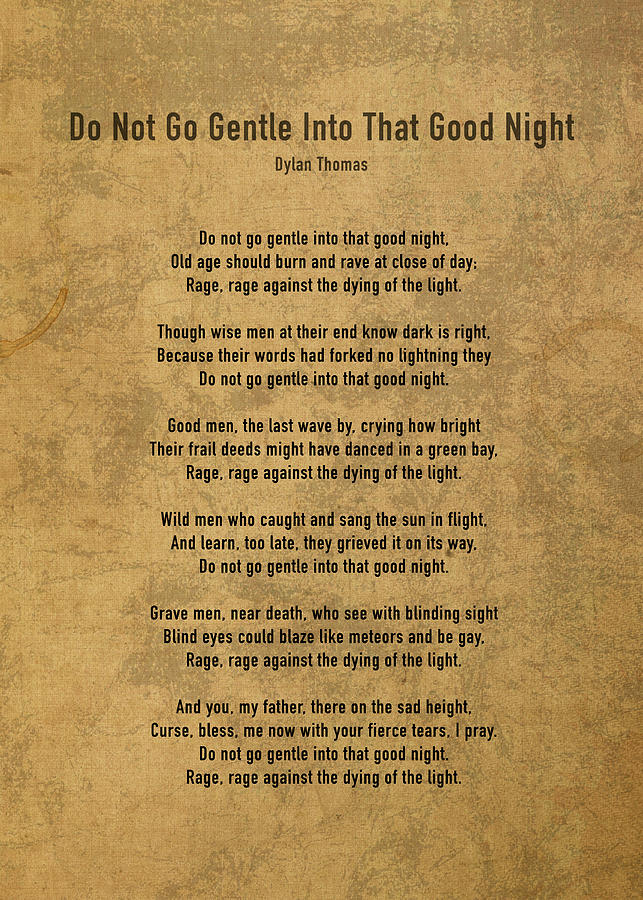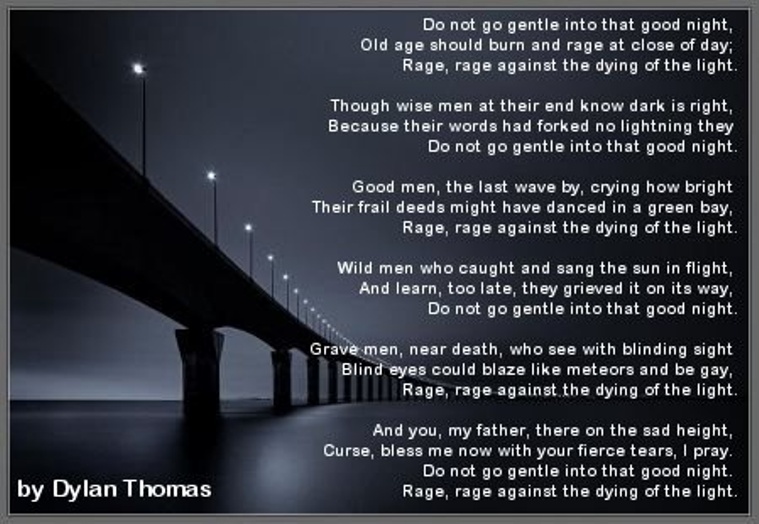


The two repeated lines then form the final two lines of the entire poem.

The first and third lines of the opening stanza are repeated in an alternating pattern as the final line of each next stanza. It comprises five three-lined stanzas or tercets, and ends with a quatrain, or four-lined stanza. For more on the villanelle structure see below.Īn interesting comparison is Owen Sheers, another Welsh poet, who praised his grandmother for the opposite - her peaceful acceptance of death - in his poem On Going.Ī villanelle is a poetic form with nineteen lines, a strict pattern of repetition and a regular rhyme scheme. It was first published in 1951, two years before the poet’s own death at age 39. The rigid form, a villanelle, suggests the poet’s attempts to control his passionate emotions. It is one of the most famous villanelles in the English language. The poem urges the older man not to give up and yield to the final ‘night’ of death. Despite his flaws, Antonio's character ultimately stands in contrast to the greedy and calculating nature of Shylock, making him a compelling and memorable character in the play.A poem Dylan Thomas dedicated to his father, David John Thomas, a militant man who had been strong in his youth, but who weakened with age and by his eighties had become blind. He is depicted as both melancholic and generous, and his selfless actions and willingness to forgive show his kindness and compassion. In conclusion, the character of Antonio in "The Merchant of Venice" is a complex and multi-dimensional individual. He is willing to forgive Shylock for demanding a pound of flesh as repayment for a debt, showing a level of mercy and understanding that is lacking in the character of Shylock. While Shylock is greedy and calculating, Antonio is selfless and compassionate. Throughout the play, Antonio's character is contrasted with that of the Jewish moneylender Shylock. This is exemplified in his willingness to offer financial support to Bassanio, even though it puts his own financial stability at risk. He is quick to offer assistance to his friends and is always willing to lend a helping hand. This melancholic disposition is likely a result of Antonio's deep love for his friend Bassanio, who he is willing to do anything to help, even going so far as to put up his own life as collateral in a risky business deal.ĭespite his sadness, Antonio is also shown to be a kind and generous individual. He is prone to fits of sadness and depression, and he often speaks about death and the fleeting nature of life. In William Shakespeare's play, "The Merchant of Venice," the character of Antonio is portrayed as a complex and multi-dimensional individual.Īt first glance, Antonio appears to be a wealthy and successful merchant, but he is also depicted as a melancholic and melancholy figure.


 0 kommentar(er)
0 kommentar(er)
